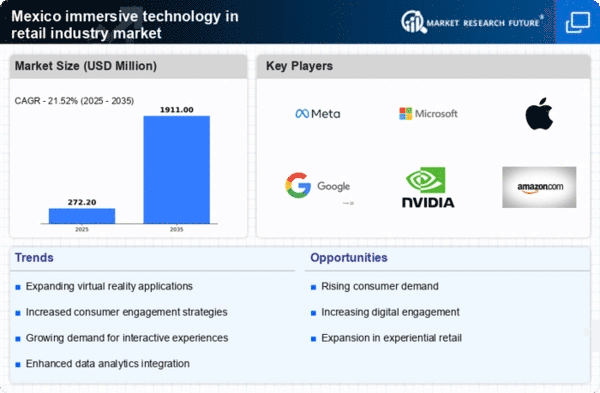Changing Consumer Preferences
Consumer behavior in Mexico is shifting towards more interactive and engaging shopping experiences. The immersive technology-in-retail-industry market is responding to this trend by offering innovative solutions that cater to these evolving preferences. Surveys indicate that approximately 70% of consumers express a desire for more immersive shopping experiences, such as virtual try-ons and interactive displays. This demand encourages retailers to adopt immersive technologies to enhance customer satisfaction and loyalty. As a result, the immersive technology-in-retail-industry market is likely to expand as businesses strive to meet these changing consumer expectations.
Supportive Government Policies
Government initiatives in Mexico aimed at promoting technological innovation are positively influencing the immersive technology-in-retail-industry market. Policies that encourage investment in digital transformation and support for startups in the tech sector are fostering an environment conducive to the growth of immersive technologies. For instance, tax incentives for technology adoption can motivate retailers to integrate immersive solutions into their operations. As these supportive measures continue, they are likely to stimulate further development and adoption of immersive technologies within the retail sector, thereby enhancing the overall market landscape.
Technological Advancements in Retail
The rapid evolution of technology plays a pivotal role in shaping the immersive technology-in-retail-industry market. In Mexico, advancements in augmented reality (AR) and virtual reality (VR) are becoming increasingly accessible to retailers. This accessibility allows businesses to create engaging shopping experiences that attract consumers. For instance, the integration of AR applications in retail stores has been shown to enhance product visualization, leading to a potential increase in sales by up to 30%. As technology continues to advance, retailers are likely to invest more in immersive solutions, thereby driving growth in the immersive technology-in-retail-industry market.
Competitive Differentiation Strategies
In a highly competitive retail landscape, businesses in Mexico are increasingly turning to immersive technology as a means of differentiation. The immersive technology-in-retail-industry market is witnessing a surge in retailers adopting unique immersive experiences to stand out from competitors. For example, brands that utilize AR for product demonstrations or VR for virtual store tours can create memorable experiences that resonate with consumers. This strategy not only attracts new customers but also fosters brand loyalty, suggesting that the immersive technology-in-retail-industry market will continue to thrive as retailers seek innovative ways to distinguish themselves.
Increased Investment in Retail Technology
Investment in retail technology is on the rise in Mexico, significantly impacting the immersive technology-in-retail-industry market. Retailers are allocating larger budgets towards innovative technologies, with estimates suggesting that spending on immersive solutions could reach $1 billion by 2026. This influx of capital enables retailers to experiment with various immersive technologies, such as VR showrooms and AR applications, which can enhance the shopping experience. Consequently, the immersive technology-in-retail-industry market is poised for growth as more retailers recognize the potential return on investment from these technologies.
















